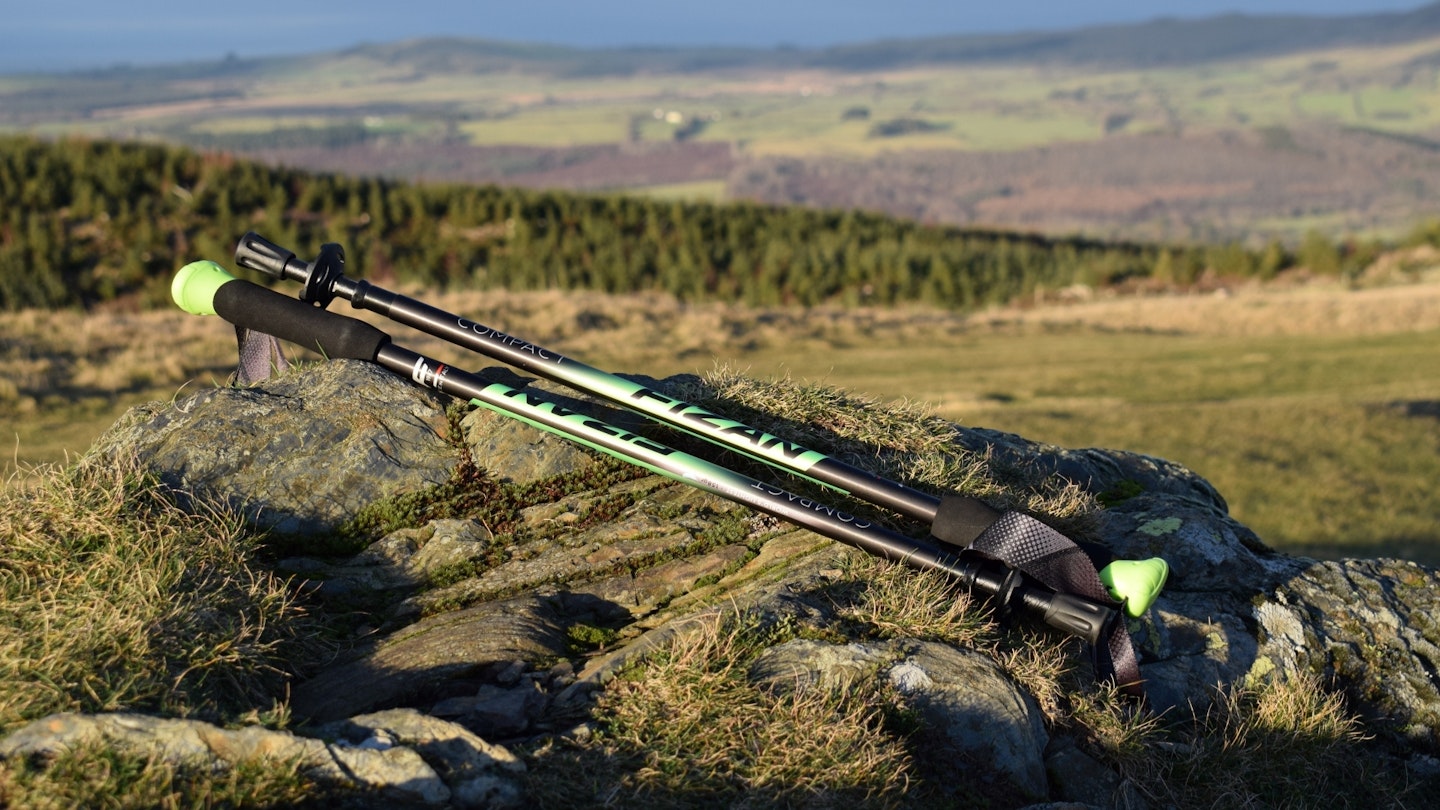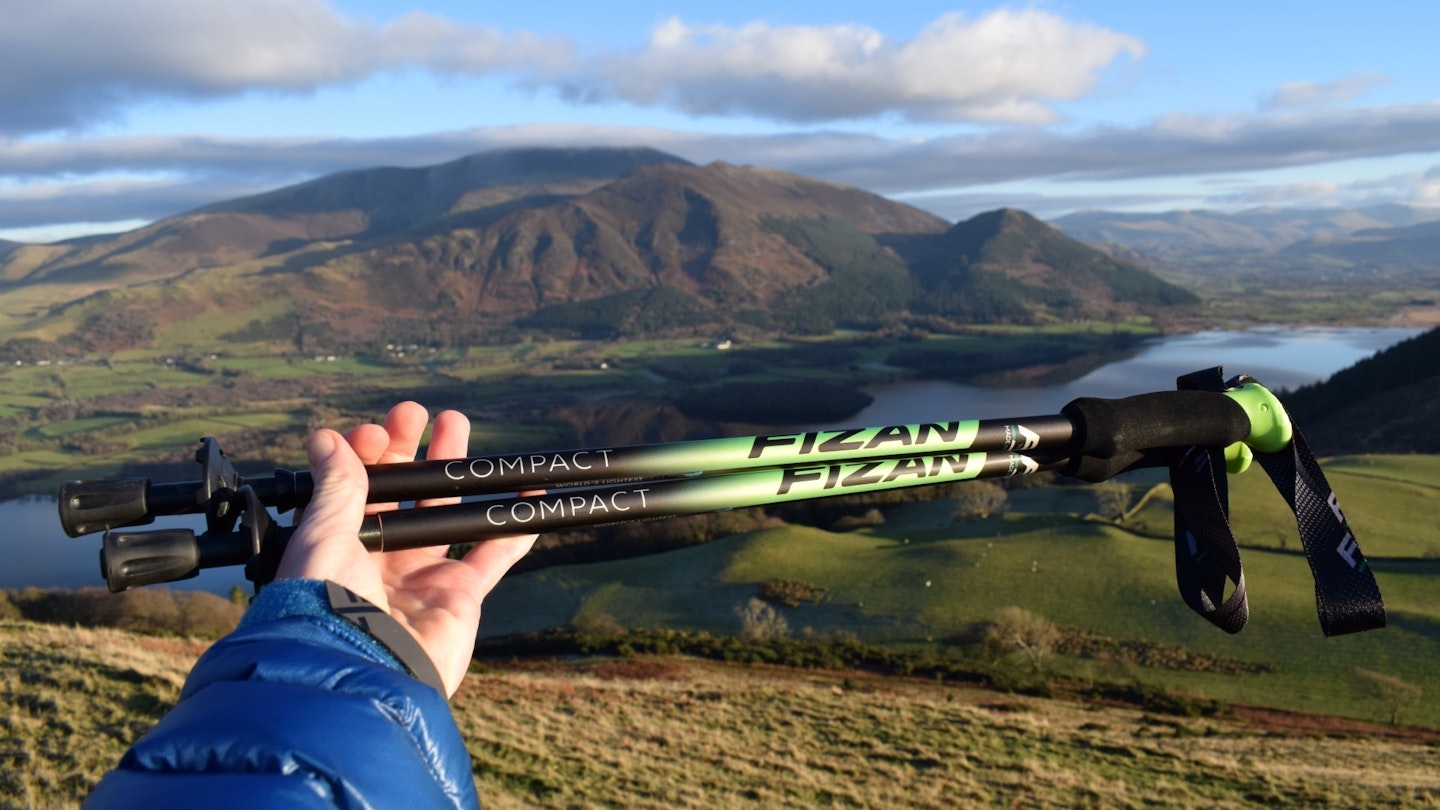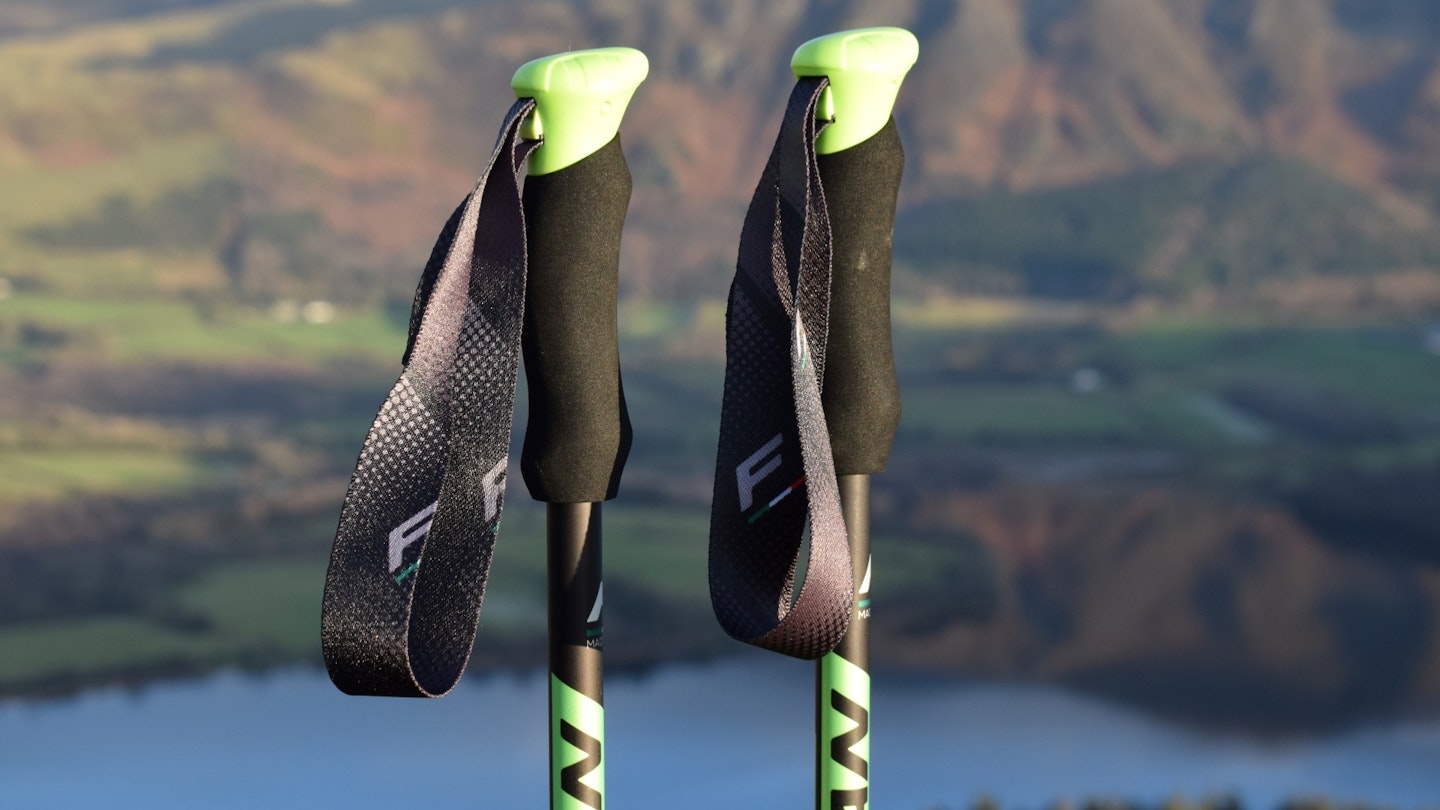Ultralight and cheap. Those two words don’t commonly go together, but that’s exactly what you get with the Fizan Compact. It weighs just 169g per pole – the lightest trekking poles on test in recent years – but it won’t cost you the earth at just £70. It’s a win-win scenario, particularly for gram-counting, bargain-hunting hikers.
In-use the light pole feels agile, nimble and easy to wield, with good comfort levels and a nice solid plant. In terms of construction, it’s a three-part aluminium pole with a telescopic design and twist-lock adjustment. Its length is 60cm in packed-away mode, which (weirdly considering the name) isn’t that compact or portable compared to some others, but adjustability is good with a 100cm to 132cm range.
The foam hand grip is comfy with nice contouring, but you don’t get an extended grip. The wrist leash is light and comfy, the carbide pole tips give good traction and the baskets work fine.
The big polarising feature, however, is that twist-lock adjustment system, an approach commonly regarded as vulnerable to degradation, slippage and ultimately failure over time (although we can’t say for certain if, or when, this might happen). Is this risk a deal-breaker? Perhaps not when the weight and price are so impressive.
Pros
- Affordable
- Great value
- Ultralight
- Good features
Cons
- Twist-lock system
- Quite long at 60cm, not the most portable
- No extended grip, hand grip only suitable for small hands
- Questions over long-term durability
| RRP: | £70 / $87.10 |
| Length (folded): | 60cm |
| Adjustability: | 100-132cm |
| Weight (per pole): | 169g / 5.9oz |
| Shaft material: | Aluminium |
Design, locking mechanism, materials and durability
The Fizan Compact is made from aluminium – or, more specifically, aluminium 7001, which is a high-strength aluminium alloy made from 87% aluminium mixed with copper, chrome, zinc and magnesium. This alloy is known for its strength, stiffness and low-weight.
As an ultralight pole, it’s perhaps surprising that the Fizan Compact is not made from carbon, which is commonly regarded as the material of choice for ultralight poles. But here Fizan have achieved a very low weight using aluminium, which is an impressive feat.
The use of aluminium brings a few benefits over carbon too: it is cheaper (hence the affordable £70 price-tag) and generally considered more durable. In terms of the materials, the aluminium construction of the Fizan Compact should therefore deliver solid long-term durability and it certainly feels strong and sturdy in use.
However we’re less convinced by the long-term durability of the Fizan Compact’s locking mechanism. To save weight and cost, here you don’t get any lever-style clamps, which are generally considered stronger, sturdier and longer-lasting.
Instead the pole segments use a twist-lock adjustment system. This is how it works. Twist left to loosen the pole segments, twist right to lock them in place.
Internally these twisting movements cause ‘plastic expander’ components at the top of each pole segment to expand, thus securing the pole in the desired length.

During our initial test hikes, this system has worked absolutely fine. You don’t have to use much force to loosen or lock the pole segments, and they seem very secure, solid and stable when locked-in.
But this is always the case at the beginning with twist-lock poles. They will work fine for several months or perhaps up to a year. But over time, however, they are notorious for deteriorating and ultimately failing.
Eventually the plastic expanders will lose their elasticity, clogged up by dirt, grime and moisture, and at some point they will begin to slip and stop locking the segments together properly.
This certainly hasn’t happened to us yet during our initial tests, and we can’t say for certain if or when this might happen with the Fizan Compact poles. But it’s certainly an ongoing risk and only time will tell.
In terms of the all-round design, the Fizan Compact is a three-part trekking pole with a telescopic design, rather than a Z-shaped one. The main, top segment of the pole is always static, and the lower two portions slide up inside it in a telescopic style. The main pole segment is 17mm wide; the middle portion is 16mm; and the lower third is 14mm.
Length, adjustability, weight and portability
The Fizan Compact is a remarkably lightweight pole by any standards, but considering its affordable price-tag of just £70, that makes the 169g weight per pole even more remarkable.
It’s a truly ultralight trekking pole and – if you’re a gram-counting hiker who doesn’t want to break the bank – it hits the spot perfectly. It’s certainly a big saver compared to other brands’ ultralight poles, which can often set you back up to £200 for a pair.
The benefits of an ultralight trekking pole are obvious. In use it will feel lighter, more agile, more nimble, easier to wield, and comfier over long hours in the hills; and when you’re not using it, it will be easier to carry in your hiking backpack and won’t weigh you down as much.
The negatives are that it might feel weaker, less stable or rigid, less supportive and more prone to breaking or snapping.
Fizan claims confidently that the Compact is the “world’s lightest three-part trekking pole”. We’re not sure that claim can be held up to scrutiny, as we’ve tested the Gossamer Gear LT5 three-piece carbon trekking pole in the past, which has an official weight of 146g per pole (including baskets). But, putting accolades and status aside, the Fizan Compact is still a superbly ultralight pole.

The Fizan website states an official weight of 158g per pole, but on our scales it clocks in at 169g. Regardless of the discrepancy, that’ still impressive stuff – and easily the lightest pole we’ve tested in recent years.
It’s 13g per pole lighter than the top-of-the-range Leki Skytera FX Carbon SL (182g) and 39g lighter than the expensive Black Diamond Pursuit Carbon Z (208g). Compared to cheap-and-cheerful aluminium poles from Lomo and Highlander, the weight savings are even bigger, in the region of 80g per pole.
Despite the low weight, however, the Fizan Compact isn’t the most portable and doesn’t have the shortest length when folded down. Due to its telescopic design, rather than Z-shaped, the packed-away length of the Fizan Compact is 60cm by our measurements, which isn’t the best. It sticks up quite high when stored in backpack side pockets.
Compared to the Z-shaped poles of the Leki Skytera FX Carbon SL and Black Diamond Pursuit Carbon Z, which both fold down to 40cm, the extra 20cms of length in the Fizan is quite noticeable. Portability, therefore, isn’t this pole’s strongest performing metric. Indeed, perhaps it should be re-named the Fizan (Not So) Compact.
Adjustability, however, is good. The erected pole length can be adjusted between 100cm and 132cm, an impressive range, and this delivers practical versatility when out in the hills – you can easily tweak the size up or down to suit your needs.
Hand grips, leashes, baskets and pole tips
In terms of features, nothing here is particularly eye-catching or innovative, nor is anything poor or underwhelming. Everything does its job well, sticking to long-proven designs and styles, which is a wise approach for a pole that wants to be part of your essential hiking gear repertoire. “If it ain’t broke, don’t fix it”, as they say, and the components and features of the Fizan Compact all hit the mark.
Our only gripe is that the hand grip is non-extended. It just has the normal upper hand grip section, but does not have an extended panel of foam stretching lower down the shaft of the pole.
Many other poles include this feature because it’s useful to trekkers who like to micro-adjust their hand position up and down, depending on the terrain and gradient.
The extended section of the grip gives such trekkers far more versatility to use this technique and means they don’t have to faff around so much altering the actual length of the pole. For some the omission of this feature on the Fizan Compact might be a deal-breaker; for others it won’t matter at all. It really depends on how you like to use trekking poles.

In terms of the hand grip design, it is predominantly made from EVA foam with a plastic top. The foam is quite firm but comfy enough, and it has some nice curving and contouring to guide your hand position. There is a small ridge for your little finger to rest above, and another ridge for your index finger to rest atop.
Our only slight concern is the join between the foam and the plastic. Our finger and thumb rest over the two different materials, and we wonder over time whether this might prove a tad annoying – although in our limited test hikes, it wasn’t an issue.
The overall size of the hand grip is on the small side too. For us it worked just about ok; but if you have larger-than-average hands, it might prove a too small for you.
The wrist leash is a D-loop design. It feels light and comfy enough, and it size can be easily adjusted. You also get two pairs of baskets, sized 35mm or 50mm, and both perform their functions admirably, while the carbide tips deliver solid traction and bite with every placement. You also get rubber tips, which can be positioned over the carbide tips if so desired.
Verdict
An affordably-priced aluminium pole with a telescopic design, clocking in at an amazingly ultralight weight – but the twist-lock system will polarise opinion and the hand grips are small.
Shop this product
About the author

James Forrest writes regular features and route guides for Trail and has been one of our main gear testers for the last few years. James is based on the edge of the Lake District so when he isn’t off on his latest crazy adventure or challenge, he’s walking in his local fells.




